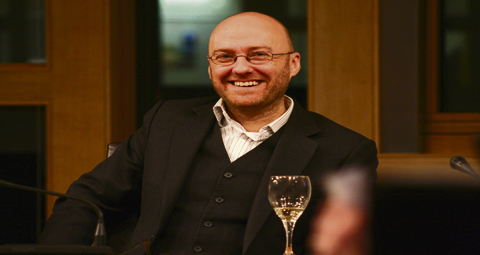February 13 | ![]() 0 COMMENTS
0 COMMENTS ![]() print
print

Greens’ leader gives colour to views
The second in a series of interviews with Scottish political party leaders sees SCO editor LIZ LEYDON ask the Scottish Green Party leader Patrick Harvie about crucial voting issues such as assisted suicide, faith schools and marriage
Meeting Patrick Harvie MSP as controversial assisted suicide legislation reached the health committee of the Scottish Parliament, it’s difficult not to let the topic dominate. Like many of the pre-general election issues we discuss, Mr Harvie—who preferred to be interviewed in his Glasgow offices rather than the SCO offices—is passionate about his stance and engaging in his arguments.
The MSP, co-convenor of the Scottish Green Party, identifies himself as an atheist secularist who respects other’s right to believe.
“We have to support, respect and recognise that people come to the issue, and the issues, from very different value systems,” he said.
Assisted suicide
Mr Harvie is behind the controversial Assisted Suicide (Scotland) Bill, the member’s bill he inherited when Margo Macdonald died in April last year. On the bill’s introduction, Mr Harvie was, under Rule 9.2A of the Parliament’s Standing Orders, designated as an additional ‘member in charge’ of the bill. It is not an uncommon move, he said, but carried particular significance as Ms Macdonald’s Parkinson’s disease progressed.
“She had good and bad days even before the very end,” he said of the late Independent Lothians MSP’s commitment to the legislation, which the Church emphatically opposes, before she died. “I knew that might happened when I signed up on the bill.”
Mr Harvie said prior to Ms Macdonald’s first failed bill on assisted suicide in 2010, he was already interested and behind Liberal Democrat MSP Jeremy Purvis’ suicide bill at Holyrood in 2005. He does not believe legalising assisted suicide would open the floodgates in the way it has done with abortion.
“In countries where assisted suicide is already legal, only a small proportion of those wishing for that option actually exercise it,” he said. Nor does he see decriminalising assisted suicide as an alternative to investing in good palliative care, or foresee it placing a burden on the elderly or the sick. “People deserve to be informed, empowered… in their own lives,” he said. “No one wants a prolonged, painful death and a small minority of people want the opportunity to take control.”
Even fewer will choose to exercise the right to die, he said, but to ‘avoid extreme levels of distress, I hope we will see some progress’ be it through the current bill proposal, Lord Falconer’s efforts at Westminster or in the future. He added that there is also ‘a need for better palliative care,’ which he sees as the other side of the ‘same coin.’
“But even the highest standard of palliative care is not perfect as it cannot remove every part of suffering,” he added. As for abuse of legal assisted suicide if it were to be normalised in our society, ‘evidence does not bear that out,’ he said. “Assisted suicide has been legal in Oregon in the US for 17 years and we don’t see the ‘nightmare scenario,’ happening there, ” he said. “People in this country are already making these choices with DNRs.”
The health committee’s final hearing on the bill is scheduled for February 17.
At odds
On other life issues, Mr Harvey is also at complete odds with the teachings of the Catholic Church, which holds life as a sacred gift from God. In addition to supporting the push to legalise assisted suicide, Mr Harvey sees abortion as ‘normal part of the health service’ to avoid ‘additional stigma.’ The former sexual health and equality support worker ‘respects the reproductive rights and choices of women and men.’ However, he and the Scottish Green Party ‘respect individual conscience and the right to vote differently.’
He sees the advantage of abortion being a devolved issue, deeming ‘appropriate’ control issues such as a reduction in the two doctor requirement for rural places such as the Scottish Islands. He believes the High Court ruling against two Glasgow Catholic midwives over conscientious objection to supervising staff involved in abortion was the ‘correct’ one.
“The alternative would have been a huge barrier to adequate service and women’s access to it,” he said.
Other subjects Mr Harvie and the Greens are at odds with the Catholic Church on include faith schools and same-sex marriage.
“The Greens support an integrated secular education system,” he said, reconfirming what is often seen as the party’s secular agenda. “Children have the right to a neutral education.” He argued for a child’s right to challenge and explore, not to be restricted to one particular belief systems and he seemed unable to grasp that Catholic schools already offer this opportunity. He says Scottish society is increasingly secular and there are fewer examples of high levels of ‘religious practice’ even where there are ‘high levels of religious identity.’
While the Greens were ‘against the Scottish Government’s The Offensive Behaviour at Football and Threatening Communications (Scotland) Act 2012,’ they recognise sectarianism.
“We were against this bill from the start as it was designed to accentuate the them and us,” he said. On civil unions and, later same-sex marriage, Mr Harvie was at the forefront of pushing for change in Scotland, although both issues were eventually passed at UK level.
“Family law is a devolved issue,” he said. “Equality for the LGBT community is something I felt strongly needed and deserved to be debated. It is the right thing to do. “It took a very long time… decades… to get the same level of recognition and full equality,” he said. “Even now there are those in the transgendered community still campaigning.”
His views on marriage are at odds with Church teaching that marriage is the union between one man and one woman to raise a family. Mr Harvie would also like to make civil partnerships open to traditional male/female couples.
Consensus politics
On paper, the Green Party and Catholic voters do have topics in common too, including ethical economics, welfare, nuclear weapons and climate change
“From a moral focus, our ‘zombie economy’ is dead, it just doesn’t know it yet,” he said. When it comes to nuclear weapons such as Trident, Mr Harvie and the Greens are in favour of unilateral disarmament, believing any other approach is fooling no one.
“Weapons of mass destruction are a relic of the cold war mentality,” he said. “To stockpile such weapons, never mind to use them, is morally indefensible. Why would we want to buy another generation of such weapons?” He sees alignment between faith groups and his party over climate change, an issue that SCIAF, Pope Francis and many eco-congregations are active in.
“The effect of religious communities mobilising can be profound, on the issue of climate change it has real potential,” he said. Mr Harvie plans to read the Pope’s upcoming encyclical on the environment and has no qualms with the Holy Father intervening for the common good.
“If someone who believes in a higher power, a deity, wants to argue that our world is a gift from God that needs to be protected, so be it,” he said. Mr Harvie made the moral comparison of need for the global abandonment of fossil fuels to the historic abolition of slavery, economic loss to do the right thing.
Future
The Scottish Greens—who backed the Scottish Government in last year’s independence referendum —still support independence for Scotland and Mr Harvie thinks the country’s abundance of natural resources would be better managed in an independent Scotland
“There was a referendum, however,” he said. “Yes did not win. That is the result we have to work with for the foreseeable future.”
However, he sees the changing political landscape in Scotland and the UK, with devolution and also with traditional party ties in decline in heartlands, as advantageous for the Greens as more of the electorate vote on the issues not along party lines. He also sees the need for and benefit of consensus politics, using the example of the Climate Change Act which all parties at Holyrood agreed on.
What they couldn’t agree on was ‘what do to achieve the aims,’ afterwards he said. Divides The co-convenor of the Scottish Greens entered the Scottish Parliament in 2003.
He is a persuasive yet moderate face of the party’s views but he has ties with broader secular organisations. In previous meetings with Mr Harvie, he was quick to suggest to the SCO that the Catholic Church, and religious communities generally, had political reach and influence disproportionate to their minority status and alleged decreasing numbers in a secularised society, yet he has no qualms when the Greens, secularists or the LGBT community win a hearing or battle disproportionate to their even smaller minority in society.
There is no doubt than there is an overlap in concerns of the Church and the Greens, and a need for mutual respect, but the issues that divide remain vast. What we must remember, in our political landscape, the smaller parties increasingly hold the balance of power, power disproportionate to their share of the vote.










